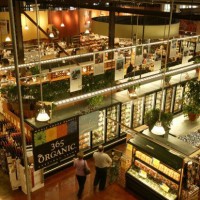La Fageda is one of Spains most successful dairy farms. Its also a co-operative which employs mentally ill people. Giles Tremlett meets its inspirational but ageing founder as his vulnerable workers wonder what will happen once he retires

In 1984 a disillusioned Spanish psychologist named Cristbal Coln drove his Citron 2CV through a high-canopied Catalan forest called La Fageda den Jord. Coln had walked through this airy, enchanted forest with his Bouvier des Flandres cattle dogs many times, but now he was on his way to buy a farm. The bearded, earnest 34-year-old had embraced the ideas of both Marx and Freud during the heady years of Spains transition to democracy in the 1970s. But he was shattered by his experiences in Spains mental asylums, where the misfits of society were parked by a country that believed giving them bed and board was the limit of its responsibility. Some were mentally ill, but others were simply those who society had deemed strange, he said.
Coln, whose name translates into English as Christopher Columbus, had recently moved to the nearby town of Olot and had an unlikely idea. Hed decided that the patients in the local asylum in Girona needed jobs. He no longer believed people who did not fit into society should be defined via the 2,500 mental illnesses catalogued by psychiatrists. The one thing they have in common is the idea that we are what our brain is. But we are much more than that, said Coln.
Nor did he want patients simply to be doing things to occupy their time. Instead, he believed they could be an effective part of the local economy, and that this would allow them to be valued as contributing members of society. I wanted them to recover their dignity and their freedom. The asylum took that away. When people reach into their pockets to buy something, they are automatically giving value to the work that has gone into making it.
Since nobody was going to hire his sometimes fragile, often eccentric band of workers, Coln decided he needed to become a businessman. As someone who had been an apprentice tailor at the age of 14 (before turning to psychology), he was a practical man, but he had no expertise in entrepreneurship. He also wanted his company to be based in a place of great natural beauty. I knew that would be good for me, he said. So why wouldnt it be good for others?
The Garrotxa region, deep in the heartland of Catalonia, seemed perfect. His work in Girona meant he already had contacts and potential workers in the area. Some locals, however, wondered whether he himself had escaped from an asylum. I told people that my name was Christopher Columbus, that I came from the asylum and wanted to set up a business in the middle of the countryside, he said. With a name and a project like that, some people thought I was the madman.
His special workers co-operative, which he named La Fageda, after the forest, began by providing manual labour from its base at an old convent building shared with the fire brigade. But Coln wanted a farm. I wanted us to produce something of value, not to provide cheap labour to others, he said. When the Els Casals farm came up for sale its farmhouse crumbling after years of neglect, but with space for a small dairy herd he saw fate at work. The place sat in dramatically beautiful surroundings right beside the forest. He sweet-talked local banks into lending him part of the 90,000 euros (72,000) needed to buy it. But could this company, owned by a workforce deemed to be mentally ill, compete in the raw world of 20th-century capitalism? Many suspected not.
Thirty-five years later Coln runs a business with 256 employees and annual sales of 16m euros. La Fageda, which makes high-quality yogurts, jams and ice cream, has been studied at business schools as far away as Harvard. More importantly, it has fulfilled its aim of giving employment to almost the entire population of work-capable mentally ill people in La Garrotxa.
There have been many ups and downs. Attempts to set up as a carpentry workshop, paint shop and a compost supplier all failed dramatically. A successful milk business was ruined by entry into the EU with its milk lakes and enforced quotas. That forced La Fageda to turn the milk provided by 350 Friesian cows into yogurt. The farms forestry nursery which had been one of the biggest of its kind in Spain ran out of work after the economy nose-dived in 2008. Fortunately at that point, La Fagedas brand was successful enough for it to add jam-making to its activities. We have made many mistakes, said Coln. But we know there are many things we dont know, so we ask people. And that is our strength.
La Fageda ran on enthusiasm for many years, its staff and workers giving up weekends to tour towns with cuddly calves and samples of their yogurts. Those in charge sometimes found themselves working late into the night in order to fulfil orders on time. Finally the creamy, full-fat yogurts made from La Fagedas own milk became a runaway success. Fifteen years ago Coln began to hire a professional management team, though he remained the boss his voice carrying the day at co-operativists assemblies where only some understood what was being said and everyone was happy to follow his lead.
It soon became obvious that the La Fageda project radically improved the lives of its worker-owners. People who had repeatedly tried to kill themselves stopped doing so. Those who took a monthly salary home found they were no longer a family burden. For others, La Fagedas residential units in Olot also provided a solution to their needs outside work. That explains why La Fageda is attracting international attention. Anna Thomson is a filmmaker who is using Kickstarter to crowdfund Yoghurt Utopia, a documentary on La Fageda. She says its inspirational nature has now reached people all over the world, from mental health advocates in Turkey to social entrepreneurs and celebrities, such as Michel Roux and Maureen Lipman.
Mara Portas was one of the first who made the journey through La Fagedas woods with Coln in the mid-1980s. The only daughter of a poor peasant family, she had been left looking after her elderly mother before having a breakdown, being diagnosed with paranoid schizophrenia and sent to the asylum. As a young girl she was, as she put it, tricked by a young man and, as a single mother, had joined a category of social outcasts in Francos Spain. The baby boy, however, was beautiful and she stopped her parents from handing him over for adoption. He was so lovely, she said. Having a child is the best thing that can happen to you. But little Miquel died of cancer, aged just four. Maria never fully recovered.
Now aged 77, she still comes to the farm every day, to a pensioners club that is part of La Fagedas social support services. I feel secure here, she explained. She was happiest in the forestry nursery and is proud of what they have achieved. Work remains important, though there is little for her to do. It is something we find with the older people, said one of the careworkers, Violete Bulbena. They really, really want to work. Some of the younger generation are not so keen.
Among the more remarkable stories is that of 57-year-old Luis Martnez, whose mother Margarita heard about La Fageda from her home city of Mendoza, Argentina. Luis had been diagnosed with schizophrenia. I just think he is different, with a different way of looking at the world, said Margarita, now aged 87. Eight years ago she decided they should emigrate to Spain where her parents came from and rented an apartment in Olot. One day she appeared at La Fageda in a taxi with Luis. Now I see that he is happy, she explained. He likes to work. When you see him so joyful with his compaeros you realise that these people have an angel inside.
La Fageda is divided into three categories: the clients who come to the occupational therapy facilities, the workers, and the so-called professionals. The latter are mostly management, therapists and care workers. We like to say there are people here who have certificates saying they have a degree of disability and there are others of us who dont yet have them, said Albert Riera, who became communications chief a dozen years ago. Colns daughter Maria, who is one of La Fagedas psychologists, said they do not need doctors on site. An unobtrusive form of supervision allows them to tailor tasks to individuals while keeping an eye on their health. We can usually spot when something is beginning to go wrong and call in medical help, she explained.
Just as La Fageda looks after its people, so it looks after its cows. The herd is farmed in large open stalls. A few weeks ago they were nibbling on hay while baroque chamber music was piped to them from loudspeakers. This is also marketing. La Fageda has a sponsorship deal with Barcelonas most important concert hall the spectacular, modernist Palau de la Msica.
La Fageda has never sold itself as a social cause. We want to compete like any other brand, said Coln. Our message had to be that, even though we had people with disabilities, we were perfectly capable of doing things well. The farm has a visitors centre which attracts 55,000 people a year. That is the best marketing we have, said Coln. People go away not just liking the yogurt but also after seeing the forest, the cows listening to their music and the workers doing their jobs as apostles. That means La Fageda has found the holy grail of marketing by engaging peoples emotions. It also works for locals. We have helped put Garrotxa on the map, and the people here now proudly claim La Fageda as part of their world.
Like any business La Fageda has to take tough decisions and suppliers have been forced to comply with its standards. Coln is invited to lecture at some of the worlds top business schools, but the companys objective remains to provide work for, and look after, the mentally ill of the Garrotxa region. Coln is happy for it to remain a Catalan brand. We dont need to accumulate wealth, he said. But the world of business is a marvellous place to inhabit and to develop your dignity.
Coln himself is now 67 and aware that he cannot keep running the company much longer. Last year it changed from a workers co- operative to a non-profit foundation. A young team of executives mostly women has been hired. The aim is to professionalise the management and the foundations board and prepare for a handover before I die or get Alzheimers.
For people like Luis Martinez, La Fageda is a guarantee not just of work but also of future care. For his mother Margarita, it solved the problem that most worries every elderly parent of a dependent child. He was going to end up alone when I died, but he is special and needs someone to guide him, she said. Margarita will not be the first person to die without that concern hanging over her. In 2007 local hairdresser Paquita Casas, whose son Miquel was one of the early co-operativists, held on in hospital until he was installed in La Fagedas residence. A few days later she died. I know you will look after him, she had told Coln.
To support the upcoming documentary about La Fageda, Yoghurt Utopia, go to kickstarter.com
This article was amended on 3 July to correct the name of the documentarys director, Anna Thomson. Her co-director is David Baksh








